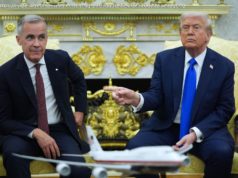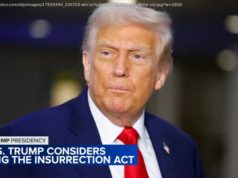The meaning of the president’s Western Wall visit
President Trump’s trip to Israel has already been marred by awkward moments—from the minor (Melania appearing to bat his hand away on the Israeli airport tarmac) to the major (Trump telling reporters that he “never mentioned the word or name Israel” to Russian officials when he disclosed intelligence about ISIS, thereby all but confirming that the intel was Israeli) . And yet, as far as some Israelis are concerned, Trump’s trip to Israel so far has been a resounding success, largely because he was the first sitting president to visit the Western Wall.
The Western Wall, known to Israelis as the Kotel, is part of the retaining wall around what was once the Second Temple, the center of Jewish life between 530 BCE and 70 CE before the Romans pillaged Jerusalem and sent Jews into exile. Today, the Western Wall is the second most holy place in Judaism after the Temple Mount. Jews from all over the world make pilgrimages to the wall, stuffing its ancient cracks with notes to God.
To Israelis, the Western Wall is more than just a religious place; it’s also a national site. New Israeli soldiers are sworn in at the wall, and deceased Israeli soldiers are memorialized there. It is the physical embodiment of the Israeli claim to Jerusalem as the eternal capital of the Jewish people.
Israeli Settlers Weren’t Always So Religious—They Were Once Secular Hippies
Trump framed the Western Wall visit as a personal moment, but there’s no question it was done for public consumption—and the media ate it up. Although the Israeli press speculated that Trump’s family would insist on sticking together—thus breaching the strict gender segregation rules at the Western Wall, and potentially enraging Orthodox Jews—the men separated from the women in the end.
Not wanting to miss a moment of the Trump family at the wall, Israel’s Channel 2 broadcast the visit on a split screen with the men on one side and the women on the other, at one point showing Ivanka appearing to cry. Einav Schif, the TV critic at Israeli newspaper Yedioth Ahronoth, predicted that the photograph of Trump at the wall would be on the cover of every printed newspaper in Israel by morning.
“In Israel, his approval rating is going to skyrocket, especially compared to what is happening in the U. S. A., ” Schif said. He noted that the visit was a win-win for Trump and Israel, fulfilling Trump’s need for good press and Israel’s need for a show of solidarity after eight years of chilly relations with the Obama administration.
Israelis reacted to Trump’s visit with “affection, ” added Uri Dromi, a former spokesman in the Shimon Peres and Yitzhak Rabin governments. “Whether you hate Trump or you love Trump or you believe him or you think he is going to be impeached, here is the president of the United States, still considered the greatest leader in the world, coming to the place most sacred to Jews. That is a big message.”
The message came through for Stuart Schnee, an American Israeli living in Beit Shemesh, a predominantly Orthodox city not far from Jerusalem. Schnee, who owns a public relations firm, said he was surprised by his emotional reaction to seeing Trump at the wall, particularly because he didn’ t vote for the man whom he said “kidnapped” the Republican party. Upon further reflection, he realized that Trump’s visit seemed to transcend Trump the man.
“I felt like at that moment this has nothing to do with Trump, this is all about him representing the United States and us as Jews feeling like he is giving credit to our story and our place, ” he said.
To be sure, the Western Wall is a common stop for U. S. politicians who want to appeal to Jewish voters or appear to sympathize with Israel. When presidential candidate Barack Obama visited the wall in 2008, a yeshiva student stole the note he slipped into the cracks and sold it to Israel’s Maariv newspaper in an act deemed “sacrilegious” by the Western Wall rabbi. (Obama reportedly asked God to “make me an instrument of your will.”)
But normally, U. S. presidents avoid visiting the site because of the complex politics that surround it. The Western Wall, located in Jerusalem’s Old City, is part of the territory Israel captured in the 1967 Six-Day War and later annexed, a move rejected by virtually every other nation. The United States views Jerusalem as the subject of negotiations with the Palestinians, who strive to build a capital in the city’s eastern half. To many, a presidential visit to the Western Wall implies recognition of Israeli sovereignty at the site, prejudging the final agreement between Israelis and Palestinians.
Trump broke with this political tradition and visited the Western Wall as one of the first stops on his Israel itinerary, a potentially explosive move on the eve of the 50th anniversary of the Six-Day War and the beginning of Israel’s military occupation of Palestinian territory. But Trump tried to skirt politics by declining to take Israeli Prime Minister Benjamin Netanyahu along. The American president was joined by his wife, Melania, his daughter Ivanka, a convert to Judaism, and son-in-law Jared Kushner, an Orthodox Jew.
In videos of Trump’s Western Wall visit, Trump has a concentrated look on his face as he converses out of earshot with Western Wall rabbi Shmuel Rabinovitch and Western Wall Heritage Foundation director Mordechai Eliav over a holy book. Wearing a black skullcap on top of his yellow coif, he approaches the wall slowly, and immediately places his hand on one of the wall’s worn crevices. Then, Trump begins to sway ever so slightly against the wall, gently tapping it three times. His lips move. He reaches for a note and shoves it deep into the crevice, spending another moment there before walking a few steps backwards, perhaps in accordance with the Jewish custom against showing one’s back to the wall. He then turns, nods to the clicking cameras, and mouths “Thank you.”
In a press conference after the visit, Netanyahu told Trump that he had “touched the stones of our existence.” Yet oddly, Trump seemed not to realize the gravity of the moment until just then.






